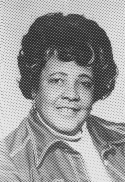Page 1
[Begin Tape 1, Side A]
Currie: First of all, let me tell you how excited I am to be doing an interview with you. I think it's going to be an adventure. I'd like to start with talking about your childhood—where you were born, what year.
Payne: All right. I'm a native of Chicago. I was born on August 14, 1911, and I grew up on the southwest side of Chicago. We lived in a community which was known as Englewood, and it was a very homogeneous place. When my parents first moved there shortly after the turn of the century, it was a mixed neighborhood, but gradually it changed and became predominantly black. But it was surrounded; it was sort of an island in the midst of a white sea, so to speak. And roughly speaking, it was bounded by 63rd Street on the south, and 59th Street on the north, and west by Loomis Boulevard, and east by Aberdeen Street. So within the confines of that, you had a tight little community, and it was a very solid community, and it was very closely knit.
Currie: How would you describe the people who lived in Englewood?
Payne: They were very ordinary people, but good, solid people. I like to think of them as the good burghers, you know. They had a sort of real stern consistency about their work and routine. There were four churches that dominated the area. One was a Baptist church, one was a Methodist church, Methodist-Episcopal, the other one was another Methodist church, and then there was a Presbyterian church. And you could almost tell by the names of the families which church they belonged to.
Currie: How is that?
Payne: Well, the Presbyterians tended to live in the area of Loomis Boulevard towards 59th Street; the Shiloh Baptist people lived on May and Aberdeen, those streets, Elizabeth Street; and then the AME people, the African Methodist-Episcopal church, was Throop Street and Ada Street, and some parts of Loomis Boulevard. So it was almost, you could see, but there was a co-mingling of the people, and you knew—you knew the families. You knew them very well, even if you didn't always associate with them, but you knew the families by reputation.
Currie: And which church did your family go to?
Payne: Well, we were African Methodist-Episcopal, and I'm probably the fourth or fifth generation. My grandparents, who were slaves, after the war migrated from Bowling Green, Kentucky, to Evansville, Indiana, and they settled there. And my grandfather was a waiter in one of the hotels, and they had nine children, but they took in other relatives, because after the Civil War, former slaves were searching for long-lost relatives. And so some came, and they stayed permanently, and that was the start of the extended family among blacks. So my grandparents were known in the

